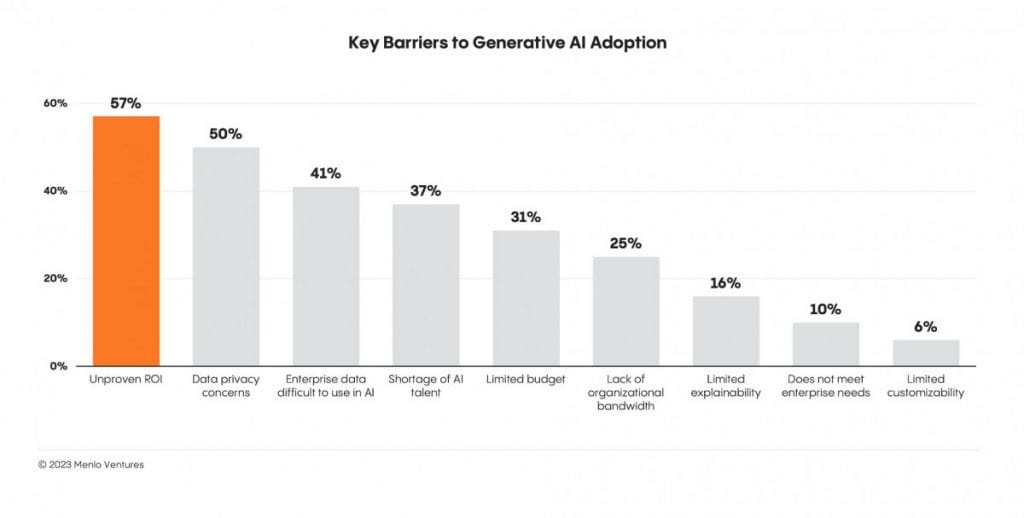Generative AI Adoption Still Low Among Enterprises: Report


In Brief
Global enterprise investment in generative AI is just $2.5 billion, a fraction of the budget allocated to traditional AI and cloud software.

Despite the widespread excitement, investment in generative AI is surprisingly modest compared to other software categories.
The enterprise investment in generative AI is a mere $2.5 billion this year, a fraction of the budgets allocated to traditional AI ($70 billion) and cloud software ($400 billion), as per venture capital firm Menlo Ventures‘ report.
While generative AI tools like GitHub Copilot and Hugging Face have gained traction, the market is still considered nascent, representing less than 1% of all cloud spending, it added.
The report titled “The State of Generative AI in the Enterprise”, based on surveys of over 450 enterprise executives across the U.S. and Europe, sheds light on key trends and challenges in the adoption of generative AI technologies.
It identified the launch of ChatGPT as a turning point in the enterprise AI landscape and notes a 7% increase in the number of enterprises using some form of AI, reaching 55% in 2023.
However, enterprises are leaning heavily towards purchasing third-party generative AI software, with 80% of survey respondents reporting such acquisitions. This trend has contributed to the overall increase in AI spending, which, in turn, has propelled the rise of tools like GitHub Copilot and Hugging Face, both of which have exceeded tens of millions of dollars in revenue.
The study reveals a notable trend of product and engineering organizations opting for in-house development of AI solutions. This approach involves heavy investments in AI teams and technology, with traditional developers and data scientists being tasked with building internal infrastructure.

Established Tech Players Embrace Embedded AI
Unlike newer competitors, industry players are swiftly adopting an “embedded AI strategy,” integrating AI capabilities into their existing products to secure a stronghold in the market.
One prominent example of this strategy is Microsoft Copilot, an AI companion integrated across Microsoft’s suite of applications and services, including Microsoft 365, Windows 11, Edge and Bing. With a forecasted contribution of over $10 billion in revenue in the coming years, Copilot exemplifies the potential lucrative outcomes of the embedded AI approach.
Contrary to this, a wave of AI-native solutions has emerged, aligning with existing SaaS categories. However, these newcomers face tough competition against established leaders.
Likewise, despite a current investment of $2.5 billion in generative AI, enterprise solutions have yet to fulfill their promise of transformative impact. The key hurdle lies in proving the tangible value of these solutions, as enterprise executives remain skeptical due to concerns about unproven return on investment.
According to industry experts, the future of generative AI adoption hinges on powerful context-aware, data-rich workflows. Buyers demand more than incremental gains in efficiency; they seek solutions that offer a significant leap in productivity, replacing outdated methodologies and rewriting workflows in novel ways.
Overall, while the market is still in its early stages, the findings suggest a growing interest and a shift in enterprise strategies towards embracing AI technologies.
As the industry looks toward the future, startups that successfully deliver context-aware, data-rich workflows are anticipated to be the driving force behind unlocking generative AI adoption and capturing the attention of the broader enterprise market.
Disclaimer
In line with the Trust Project guidelines, please note that the information provided on this page is not intended to be and should not be interpreted as legal, tax, investment, financial, or any other form of advice. It is important to only invest what you can afford to lose and to seek independent financial advice if you have any doubts. For further information, we suggest referring to the terms and conditions as well as the help and support pages provided by the issuer or advertiser. MetaversePost is committed to accurate, unbiased reporting, but market conditions are subject to change without notice.About The Author
Kumar is an experienced Tech Journalist with a specialization in the dynamic intersections of AI/ML, marketing technology, and emerging fields such as crypto, blockchain, and NFTs. With over 3 years of experience in the industry, Kumar has established a proven track record in crafting compelling narratives, conducting insightful interviews, and delivering comprehensive insights. Kumar's expertise lies in producing high-impact content, including articles, reports, and research publications for prominent industry platforms. With a unique skill set that combines technical knowledge and storytelling, Kumar excels at communicating complex technological concepts to diverse audiences in a clear and engaging manner.
More articles

Kumar is an experienced Tech Journalist with a specialization in the dynamic intersections of AI/ML, marketing technology, and emerging fields such as crypto, blockchain, and NFTs. With over 3 years of experience in the industry, Kumar has established a proven track record in crafting compelling narratives, conducting insightful interviews, and delivering comprehensive insights. Kumar's expertise lies in producing high-impact content, including articles, reports, and research publications for prominent industry platforms. With a unique skill set that combines technical knowledge and storytelling, Kumar excels at communicating complex technological concepts to diverse audiences in a clear and engaging manner.





















































